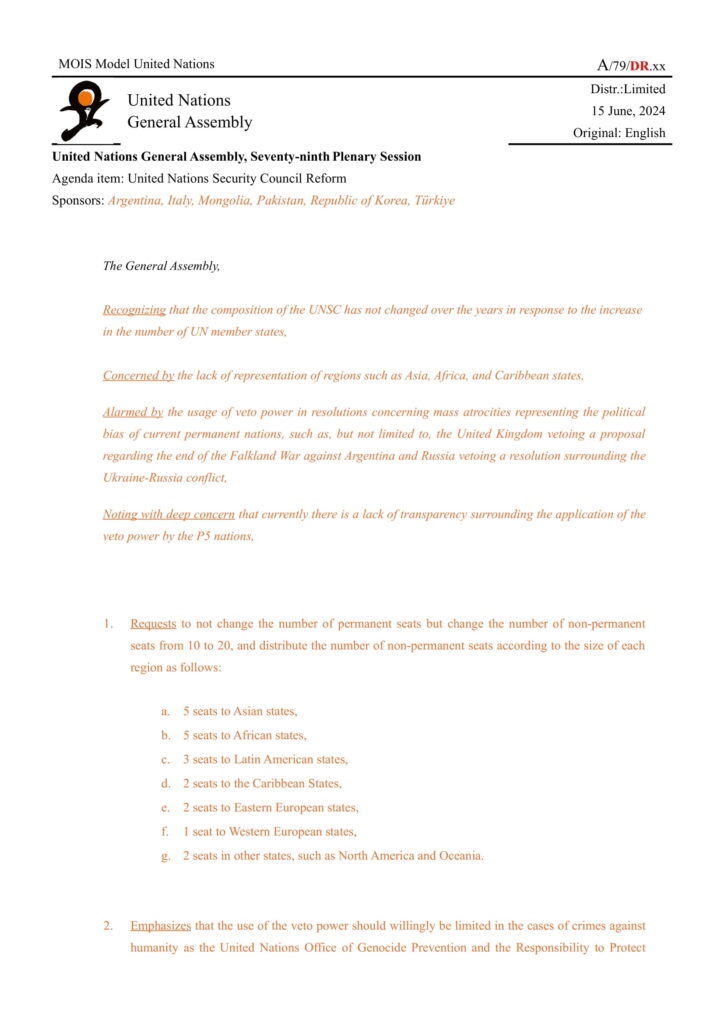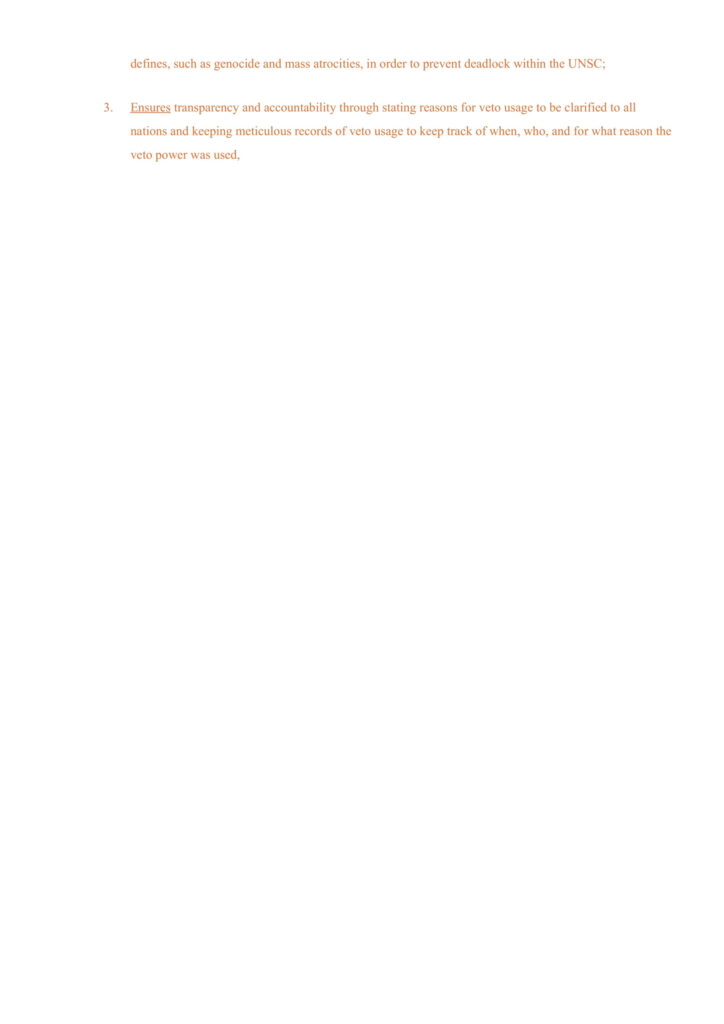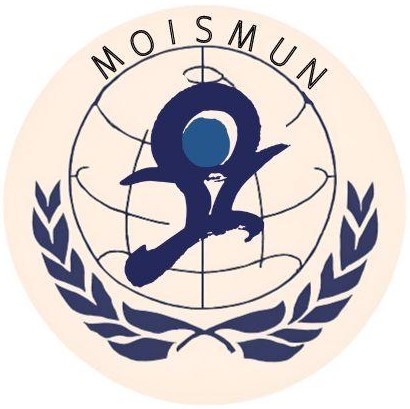このページでは、Position Paper,Negotiation Paper,そしてDraft Resolutionの作成方法についてご紹介いたします。
List
Position Paper
PP(Position Paper)は、議題に関する自国の立場や考えをまとめたものになります。模擬国連では、本番前にPPを議長に提出し、自国のスタンスを示す必要があります。各国の大使が、自国が置かれている状況を再確認するだけでなく、議長が進行の指針にこのPPを用いるため、非常に重要な文書であるといえます。以下では、PPを実際に書くまでの流れを説明します。
1.議題理解
ここでは、「安全保障理事会の在り方」を議題の例として、PPの書き方を説明します。まずは議題理解です。先に議題について調べた方が、後に自国のことについて調べるときにどんなことを調べればよいのかが分かりやすいため、まずは議題について調べることを推奨します。
議題理解では、まずは題名に載っている言葉について調べるとよいでしょう。今回の例では、「安全保障理事会」という単語がそれに当たります。調査の際は、政府が出しているデータなど、信頼できる出典を見ることが望ましいです。
その後は、実際に問題となっていることについて調べます。今回の場合、安全保障理事会では議席拡大と拒否権について議論されているため、この二つについて調べます。議題によっては、運営から提示されている議題解説書(Background Guide)に、簡単な情報や歴史が掲載されていることがあるので、そちらを参考してもよいです。


I
2.自国理解
議題に関する調査が終わった後は、自国の調査を行います。まずは、担当国に関する基本データをまとめます。外務省のHPには、世界の国々の情報が記載されている「〇〇基礎データ」というページがあるので、初めはそちらを参考にするとよいでしょう。外務省のページ:https://www.mofa.go.jp/mofaj/area/index.html
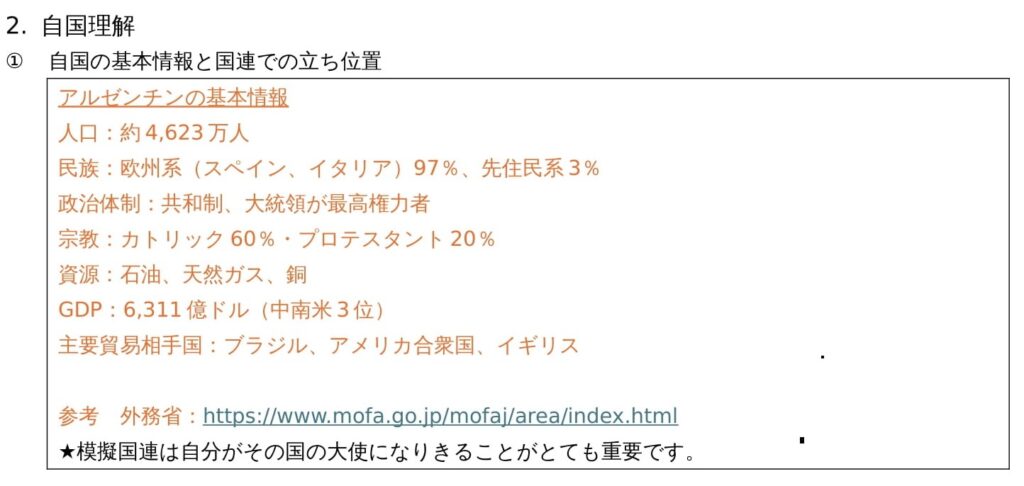
基礎情報を調べ終えたら、議題に対する自国の立場について調べます。こちらも、議題解説書(Background Guide)に記載されている場合があるのでチェックしてみてください。さらに堀深める場合は、その立場をとるに至った経緯や、周辺国のスタンスについても調べるとよいでしょう。特に、非公式討議では、似た考えを持った国々でグルーピングが行われるため、他国のスタンスを知ることで会議を有利に進めることができます。
今回の例では、議席拡大と拒否権それぞれの立場と、関連する歴史について調べています。また、安全保障理事会については、すでにいくつかのグループ分けが行われており、後の非公式討議で重要な情報になるため、それについてもメモしています。
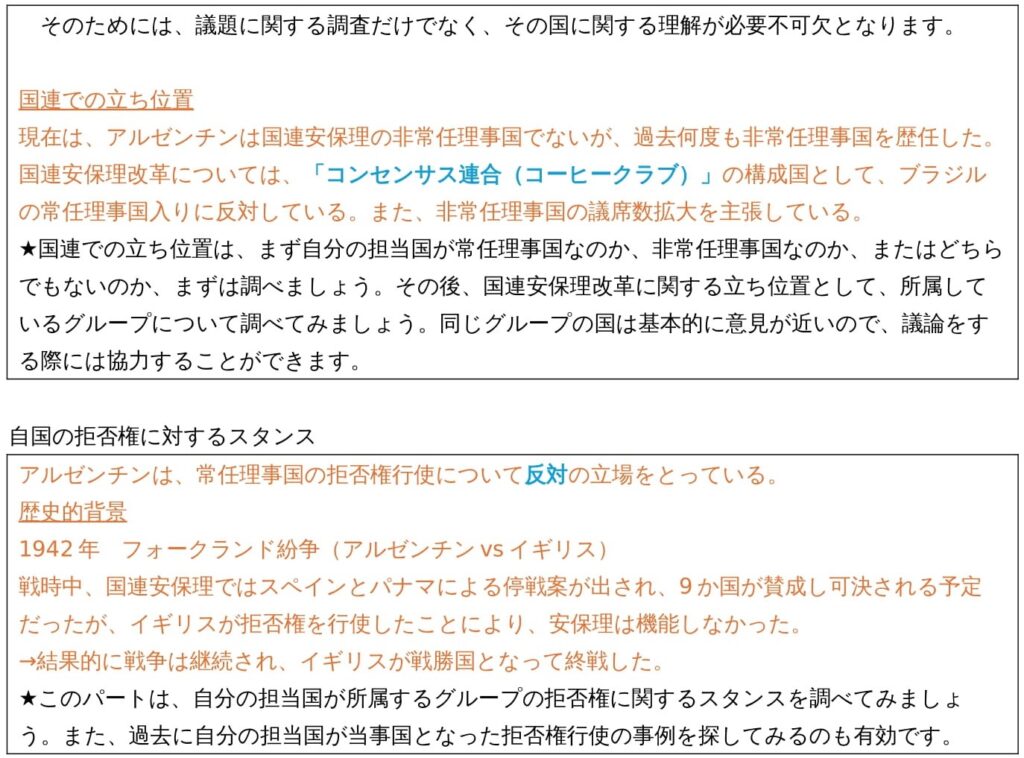
3.国益設定
議題と自国についての調査が終わったら、自国の国益設定に入ります。国益とは、文字通り国の利益のことです。模擬国連における国益は「どれだけ自国が理想とする政策に近づけるか」を尺度に図られます。今回の例では、議席拡大と拒否権について、グループとしての国益と、自国としての国益の両方を書いています。その際、理想の国益(トップ)と、これだけは叶えたいと思う国益(ボトム)を決めることで、非公式討議の際にお互いの妥協点を見つけやすくなるでしょう。
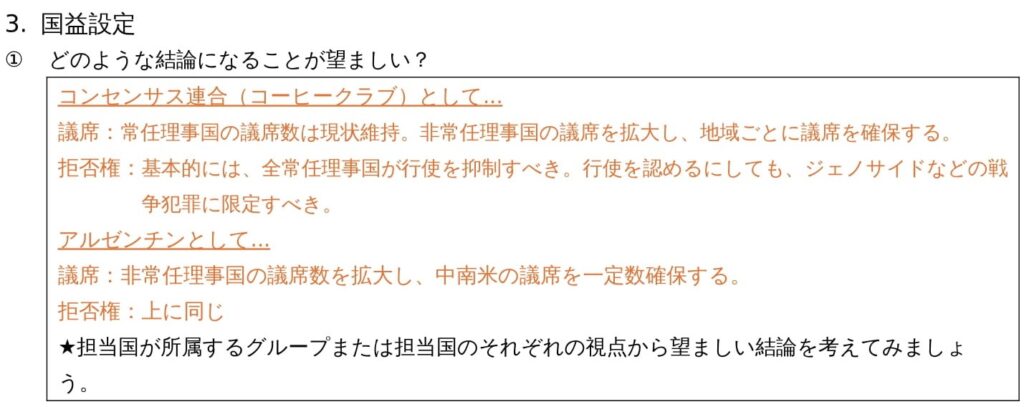


4.戦略&政策策定
準備段階の最後は、戦略&政策策定です。ここでは、他国の議題に対するスタンスを調べます。今回の例では、すでに自国が所属しているグループが分かっているので、それらの国を列挙したのち、所属しているグループ外で協力できそうな国を挙げます。また一方で、自国と意見が異なる国についてもあらかじめ調べておきましょう。
これが終わったら、自国の国益を踏まえつつ、政策を考えます。その際は、国益設定と同じく、理想の政策(トップ)とこれだけは達成したいという政策(ボトム)を決めましょう。
最後に、会議の立ち回りを考えます。非公式討議は、時間が限られているため、効率よくグルーピングを行っていく必要があります。まずは、自国と考えの近い国を中心に、話しかけに行く優先順位を決めましょう。
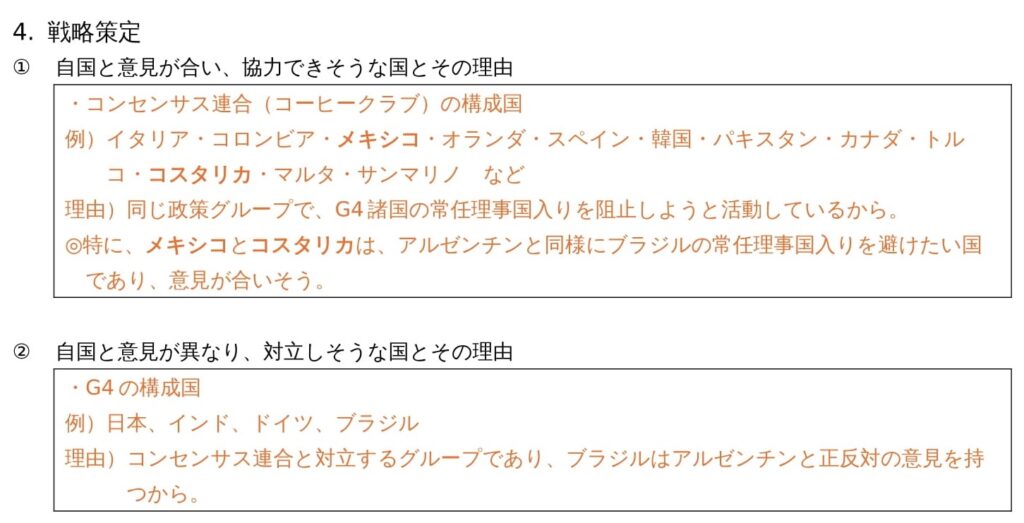
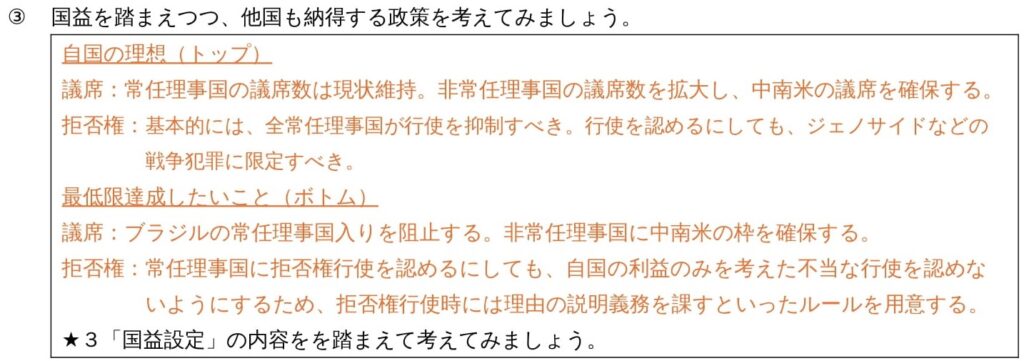

5.PP作成
これらを踏まえ、実際にPosition Paperを作成していきます。
書く内容は主に3点あります。
- 議題に関する歴史、現在の課題
議題を取り巻く具体的な課題を提示します。全体的な歴史でもいいですが、自国に関連する歴史について述べると、自国が議題に対してどのような課題意識を持っているのか、議長にも伝わりやすくなります。このパートは、後に②、③を述べるための基礎となるパートなので、しっかり推敲しましょう。
今回の例では、アルゼンチンが拒否権に対してとっているスタンスの背景として、アルゼンチンと英国の間で発生したフォークランド紛争について取り上げています。
- 自国のスタンス
次に、①で提示した課題意識を踏まえ、自国のスタンスを書きます。今回の例では、①で挙げたフォークランド紛争を経て、自国が拒否権に対してどのような考えを持っているのかについて書いています。またそれだけではなく、クラブとして、議題にどのようなスタンスをとるのかについても表明しています。
- 具体的な政策
最後に、自国の国益を最も達成することのできる政策を述べます。このパートは議長が確認するうえでも重要な部分になります。そのため、②では、大まかな自国のスタンスを述べましたが、ここではなるべく具体的に、自国の国益を達成するための政策を書いていきましょう。
今回の例では、拒否権の反対、拒否権行使の目的を限定、そして常任理事国の拒否権の不当な使用の抑制を挙げています。そして、最後にはもう一度自身のスタンスを強調しています。
The Falklands War of 1982 is one example Argentina has strong distrust of the veto. Over the Falkland Islands we confronted Great Britain for three months. The UN Security Council, while recognizing that we had committed aggression, urged Great Britain to settle the dispute peacefully with Argentina.
However, Margaret Thatcher who was the president of UK, did not respond. She used force in the name of “retaking the Falkland Islands” under the lessons learned from the Suez Crisis of 1956: “To conduct a military operation, you must have the confidence to end the war,” and “those who hesitate will lose”. On this occasion, Spain and Panama proposed a ceasefire, which was endorsed by nine countries, including the former Soviet Union. It was thought that this would end the Falklands War, but the United Kingdom vetoed the ceasefire proposal. The reasons for this veto were Britain’s confidence in its military superiority and the foreign relations cooperation of Ambassador to the United Nations Parsons and Ambassador to the U.S. Henderson.
This veto allowed the Falklands War to continue, eventually ending in June of the same year with the United Kingdom as the victor. In this war, the United Kingdom exercised its veto solely for the purpose of defense and recapture, leading to the continuation of the war. However, in terms of the damage to people and goods caused by the prolonged war, the use of the veto may not have been desirable. In general, we recognize, on the basis of this war, the overwhelming power of the permanent members of the Council with respect to the veto as a challenge. We are also acutely aware of the limitations of the Security Council system and see the need for new reforms to the current veto power.
Argentina has now agreed to form a Uniting for Consensus (coffee club) with other countries to conflict its current veto power.
The Falklands War has ended. However, we are still uneasy about the use of veto power relate to the war. We have seen firsthand that the use of the veto encourages longer wars and increases the damage. From an international perspective, this is hardly desirable. Coffee club argues that the current veto power hinders the Security Council’s objective of “maintaining peace and security. We agree with this contention and believe that reforms to the veto power are necessary to eventually limit the veto power with regarding war.
In view of the foregoing, Argentina, in accordance with the policy of its own country and the Coffee club, proposes to limit the use of the veto power with respect to war and expresses its desire to maintain and promote international peace and security.
Based on these circumstances, Argentina, in line with its own policies and those of the Consensus Union, declares its proposal to restrict the use of veto power regarding matters of war, aiming to uphold and promote international peace and security.
Following the Falklands War with the United Kingdom, Argentina has advised the permanent members of the Security Council about the dangers of using veto power in matters of war. Furthermore, as a member of the Security Council, Argentina strongly opposes any veto use that may encourage war, always prioritizing the peace and security of the international community.
Moreover, as part of the Consensus Union, there’s a call to eliminate the veto power held by permanent members, especially in areas highly prone to threats like genocide and war crimes, to promptly execute measures for peace and security. Argentina aligns with and supports this proposal.Additionally, beyond merely limiting the scope of veto power, there’s a belief that permanent members should be obliged to provide explanations to restrain the unjust use of veto power and fulfill their responsibilities within the Security Council.
The utilization of veto power by the United Kingdom during the Falklands War resulted in the escalation of war damages. This fact highlights that the current existence of veto power obstructs the role of the Security Council. With all nations bearing the responsibility for peace and security, there’s a necessity to reconsider the veto power held by permanent members.
Negotiation Paper
NPは、必ず作らなければいけない文書というわけではありませんが、作成しておくと便利なものの一つです。
NPは、模擬国連の開会前や非公式討議で他国の大使に自国の紹介を行う際に使います。掲載内容は、国名、議題に対するスタンス、自国が掲げる政策の三つになります。
今回の例では、NPの上部に自国の名前、ミドルパートには議席拡大と拒否権に対するそれぞれのスタンスと政策(議席拡大、拒否権廃止への賛成)を挙げています。
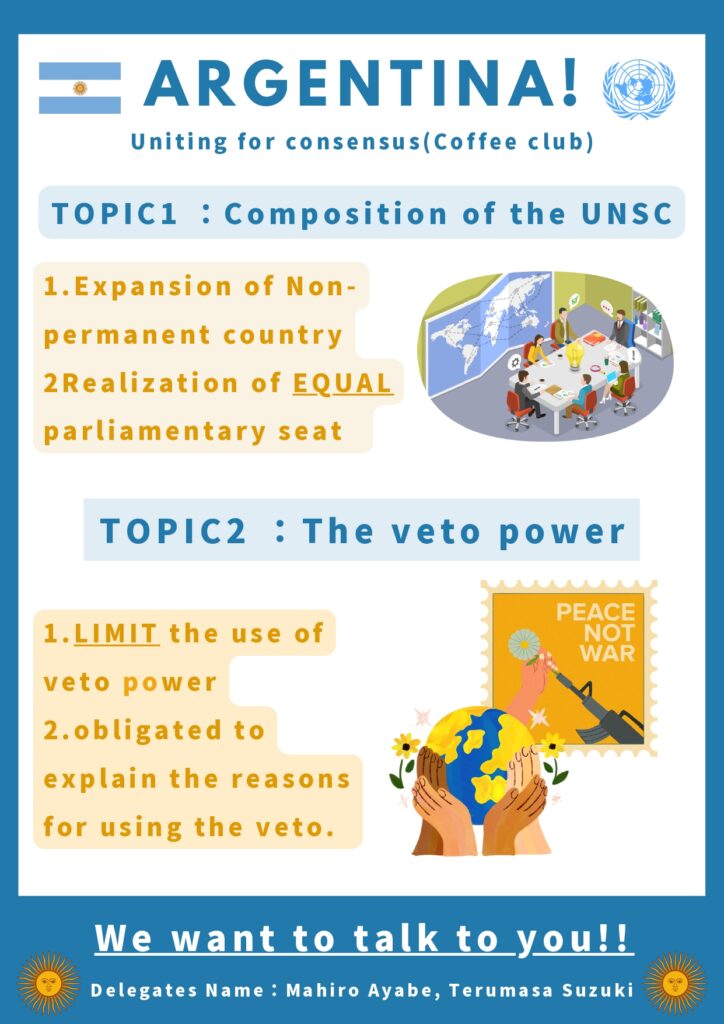
Draft Resolution
DRは、模擬国連において最も重要な文書の一つになります。公式討議と非公式討議を繰り返し、グルーピングをした後、それぞれのグループでこの文書を作成していきます。
DRには、議題、グループ加盟国、グループのスタンスと政策について書いていきます。
今回の例は、自国アルゼンチンのほかに、イタリアやモンゴルなどの国々とともに作成したDRです。「The General Assembly」の後に続き、グループとしての課題意識やスタンスを提示します。
その後、グループで考えた政策について、右のように述べていきます。政策のまとまりごとに数字で段落を分け、さらにその政策の中で細かい内容を決めている場合には、a~zの小文字英語で細分化します。
【注意点】
DRには様々な注意点があります。下記に紹介するページでは、それらについて詳しく説明されていますので、是非ご覧ください!
参考サイト
